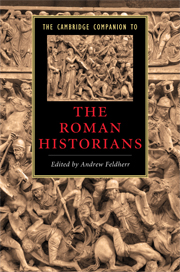Book contents
- Frontmatter
- Introduction
- Part I Approaches
- Part II Contexts and Traditions
- 4 Alternatives to written history in Republican Rome
- 5 Roman historians and the Greeks: Audiences and models
- 6 Cato’s Origines: The historian and his enemies
- 7 Polybius
- Part III Subjects
- Part IV Modes
- Part V Characters
- Part IV Transformations
- Chronological list of the historians of Rome
- Bibliography
- Index
4 - Alternatives to written history in Republican Rome
from Part II - Contexts and Traditions
Published online by Cambridge University Press: 28 November 2010
- Frontmatter
- Introduction
- Part I Approaches
- Part II Contexts and Traditions
- 4 Alternatives to written history in Republican Rome
- 5 Roman historians and the Greeks: Audiences and models
- 6 Cato’s Origines: The historian and his enemies
- 7 Polybius
- Part III Subjects
- Part IV Modes
- Part V Characters
- Part IV Transformations
- Chronological list of the historians of Rome
- Bibliography
- Index
Summary
This volume is about historical writing at Rome from the first emergence of historiography to its full flowering in the high imperial period and its later influence in European culture. As such this book serves as a companion to a series of prose authors who chose to write formal “written history” in terms both of genre and of content. Every ancient text has something to tell us about the past, particularly about the society in which it was written. By contrast Roman historians consciously set out to give an account of the past, mostly in relation to their own times and to its political culture. Our picture of Roman history is heavily dependent on the historiographical texts that have survived, aswell as on other prose histories, now lost, that served as the sources and models of the works we can still read. For the Romans themselves, however, the past was recalled and represented by many different types of texts, monuments, and rituals, both before and after historiography became a formal written genre of prose literature at Rome. Moreover, the vast majority of Romans could not read and only had very limited access to literary texts. Historiography as a literary genre is, therefore, by definition the alternative that emerged around 200 BCE to a wide variety of more or less traditional forms of memory making in Roman culture.
- Type
- Chapter
- Information
- The Cambridge Companion to the Roman Historians , pp. 65 - 76Publisher: Cambridge University PressPrint publication year: 2009
- 2
- Cited by



